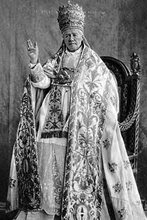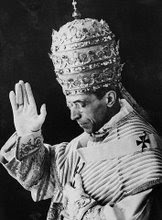The Glorious Patriarch St. Joseph
By Robert J. Siscoe
(This article was published in the March 2012 issue of Catholic Family News - cfnews.org)
On March 19, we celebrate the feast of St. Joseph, foster father of our Lord Jesus Christ and Patron of the Universal Church. The genealogy of St. Joseph, as recorded in the Gospel of St. Matthew, includes fourteen Patriarchs from Abraham to David, fourteen Kings from David to the transmigration to Babylon; and fourteen princes or chiefs of the people from the time of the transmigration up to the birth of Christ. St. Joseph was a descendent of King David, through the line of Salatheil and Zorobabel (Mt. 1), who were the rightful heirs of David’s throne. The genealogy in the Gospel of St. Luke traces our Lord’s royal blood line through the Blessed Mother, from whom he received his human nature (Romans 1:3). While our Lord received his royal blood from His mother, he was heir to the throne of David through St. Joseph, his father according to the law. If the Jews, rather than the Romans, governed the Holy Land at the time of our Lord’s birth, it would have been St. Joseph, not Herod, who would have reigned as King of the Jews. “In the veins of St. Joseph, therefore, flowed the blood of David and Solomon, and of all the noble kings of Judah. If his dynasty had remained on the throne, St. Joseph would have been the heir and would have sat on the throne in his turn. … injustice had expelled his family from the throne to which he had the right. For this he was no less a king, the son of these kings of Judah, the greatest, noblest and richest in the world. Thus in the census records of Bethlehem, St. Joseph was inscribed and recognized by the Roman governor as the heir of David” (St. Peter Julian Eymard).
As St. Joseph was the rightful heir to the throne of David, so too was his legal son, Our Lord Jesus Christ. From this we can see that our Lord was not only King of the Jews by Divine Right, but also by right of inheritance which He derived from his legal father, St. Joseph.
The Angelic Doctor teaches that it is a fundamental law of God, that when he chooses a person for a particular office, he endows him with the graces necessary to acquit him with the dignity and perfection of such office. Now, St. Joseph held the singular privilege of being the earthly father of the only begotten Son of the Eternal Father. As such, St. Joseph shared in the Divine Paternity of God the Father, as earthly father of His Divine Son. In thus considering the role of St. Joseph, we can arrive at an appreciation of the measure of grace congruent with such an exalted position. Regarding this point, Abbot Rupert wrote “at the same time that God formed the body of His Son from the most pure blood of the Virgin, He infused into the heart of St. Joseph His own paternal love, in order that the latter might be for the Incarnate Word upon earth, what He Himself is to the Uncreated Word in eternity”. St. Joseph was also chosen to be the spouse of She who was the spouse of the Holy Ghost. What graces must he have received who was not only a son of the Eternal Father, but the father of the Eternal Son, and the spouse of the spouse of the Holy Ghost?
The following is taken from the revelations of the Blessed Mother to Ven. Mary of Agreda (+1665 AD): “The heavenly Lady was either the instrumental or meritorious cause of the holiness of her spouse, or at least the final object or purpose of this holiness. For all the vast perfections of his virtues and graces were conferred upon St. Joseph for the purpose of making of him a worthy protector and spouse of Her, whom God selected as His mother. According to this standard, and according to the love of God for his most holy Mother, is to be measured the holiness of Saint Joseph; and… if there had been in the world a man more perfect and more worthy, the Lord would have chosen this other one for the spouse of His Mother. Since he was chosen by God, Saint Joseph was no doubt the most perfect man upon earth. Having created and destined him for such a high end, it is certain that God, in His almighty power, prepared and perfected him in proportion to the exaltedness of his end.” (Mystical City of God).
According to the same author, St. Joseph was 33 years of age when he was espoused to the Virgin Mary. The learned Gerson (d. 1429 AD), one of the most prominent theologians of the Council of Constance, as well as other holy writers, taught that St. Joseph was sanctified in his mother’s womb and freed from the sources of concupiscence.
On this point, Ven. Mary of Agreda wrote: “He was sanctified in the womb of his mother seven months after his conception, and the leaven of sin was destroyed in him for the whole course of his life, never having felt any impure or disorderly movements. … The Lord hastened in him the use of his reason, perfecting it in his third year, endowing it with new graces and virtues. … At this premature age he already practiced the highest kinds of prayer and contemplation and eagerly engaged in the exercise of the virtues proper to his youth; so that, at the age of seven years or more, St. Joseph was already a perfect man in the use of it, and in holiness. He was of a kind disposition, loving, affable, sincere, showing inclinations not only holy but angelic, growing in virtue and perfection and advancing toward his espousal with most holy Mary, by an altogether irreproachable life” (Mystical City of God).
While some apocryphal writings claim St. Joseph was a widower with children from a prior marriage, it is the more common opinion that he was a virgin, which St. Peter Damian affirms so positively that he seems to hold it as an article of faith.
St. Joseph was the spouse of the Blessed Mother, who is the Queen of Heaven. Now, according to ancient law, whoever espouses a queen becomes king by virtue of his marriage. From this, St. Leonard of Port Maurice draws the following conclusion: “Mary is the Queen of the Angels and Saints; St. Joseph is the spouse of Mary, therefore, he is also King of the Angels and Saints; and consequently it is allowable to invoke him by this title, notwithstanding that the Church has consecrated the custom of addressing this invocation principally to Jesus Christ”.
The Blessed Mother spoke the following words to Ven. Mary of Agreda, about her beloved spouse St. Joseph: “My daughter, although thou hast described my spouse St. Joseph, as the most noble among the princes and Saints of the heavenly Jerusalem; yet neither canst thou properly manifest his eminent sanctity, nor can any of the mortals know it fully before they arrive at the vision of the Divinity. Then all of them will be filled with wonder and praise as the Lord will make them capable of understanding… The whole human race has much undervalued the privileges and prerogatives conceded to my blessed spouse, and they know not what his intercession with God is able to do. I assure thee, my dearest, that he is one of the greatly favored personages in the divine presence and has immense power to stay the arms of divine vengeance … From now on, during the rest of thy mortal life, see that thou advance in devotion and in hearty love toward my spouse, and that thou bless the Lord for thus having favored him with such high privileges and for having rejoiced with me so much in the knowledge of all his excellences. In all thy necessities thou must avail thyself of his intercession” (Mystical City of God, Vol 3., pg 167).
St. Theresa of Avila speaks of her devotion to St. Joseph and the power of his intercession in the following words: "I took for my advocate and lord the glorious Saint Joseph and commended myself earnestly to him… I do not remember even now that I have ever asked anything of him which he has failed to grant. I am astonished at the great favors which God has bestowed on me through this blessed Saint, and at the perils from which He has freed me, both in body and in soul. To other Saints the Lord seems to have given grace to succor us in some of our necessities, but of this glorious Saint my experience is that he succors us in them all, and that the Lord wishes to teach us that as He was Himself subject to him on earth (for, being His guardian and being called His father, he could command Him) just so in Heaven He still does all that he asks. This has also been the experience of other persons whom I have advised to commend themselves to him; and even to-day there are many who have great devotion to him through having newly experienced this truth. (…) I wish I could persuade everyone to be devoted to this glorious Saint, for I have great experience of the blessings which he can obtain from God. I have never known anyone to be truly devoted to him and render him particular services who did not notably advance in virtue, for he gives very real help to souls who commend themselves to him (…). I only beg, for the love of God, that anyone who does not believe me will put what I say to the test, and he will see by experience what great advantages come from his commending himself to this glorious patriarch and having devotion to him”.
According to Ven. Mary of Agreda, St. Joseph died at the age of sixty, in the 26th year of our Lord, while in the holy presence of both Jesus and Mary. It is the opinion of many pious authors that St. Joseph was one of those who rose from the dead, body and soul, after the resurrection of Jesus (Mt. 27:33), and that he ascended into heaven bodily, fifty days later. According to St. Francis De Sales “St. Joseph is in heaven body and soul, of this there can be no doubt”.
The Blessed Mother informed St. Bridget that Holy St. Joseph frequently repeated the words “May heaven grant that I may live so as to accomplish the will of God”. And she added: “Therefore it is that the glory of St. Joseph is so great”. As we know from our Lord, what makes one truly great is not whose parent they are, or what lineage they descend from (Mt. 3:9) but rather how well their life conforms to the Will of God (Luke 11:28). Therefore, let us imitate that in St. Joseph which made him truly great: Let us seek in all things that our life may be in conformity with the Holy Will of God. And let us not neglect to petition the glorious Saint Joseph in all our needs, putting the following words of the Blessed Mother into practice: “In all thy necessities thou must avail thyself of his intercession”.
(Note from the author: Some of the information in this article was taken from the book The Divine Favors Granted to St. Joseph, published by TAN.)




















No comments:
Post a Comment